Reviving The National Soul
0by A.J Leow
My trips to Bukit Brown Cemetry tend to stir up some deep-seated emotions within me. My first, which followed a trip to Gardens by the Bay, had evoked images of contrast. On one hand, there is this rich but neglected repository of our cultural and natural heritage amid the lush, unkempt undergrowth and the other, an artificial construct or what I would often refer to as a huge manicured bonsai.
At the Gardens, you put on a headset; pressed some buttons to listen to a disembodied voice on a guided tour. It’s like calling your bank to cancel the annual credit card charge. Quite impersonal. At Bukit Brown, there are no ticket queues, entry fees or closing hours. You get to pepper some guy – in a sweat-soaked T-shirt with a towel around the neck – with questions about our forgotten past.
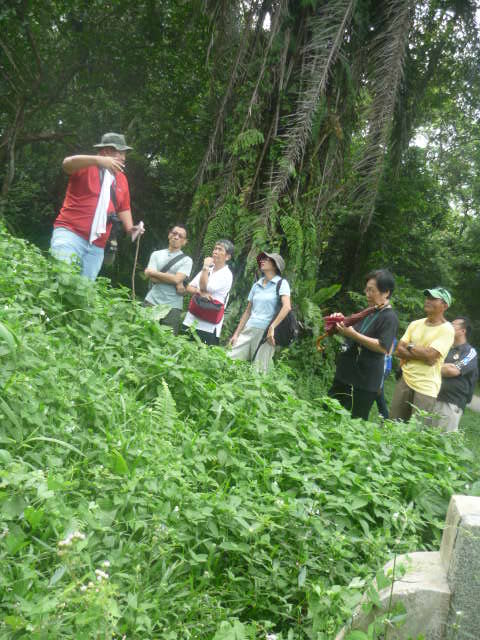
Uphill is a breeze with Brownie Peter Pak telling stories of our forgotten pioneers (photo Catherine Lim)
The bonus is that you may be invited to join the Brownies at a zhi char place after the tour for a get-together makan. How much more Singaporean can you get!
My latest trip came about on National Day 2013 which was followed by a family viewing of the annual parade and the fly-past. While the vignettes of our forefathers by the guides at Bukit Brown – especially that of how they arrived by sea and spied the shimmering lights of the harbour of 星汌 (Isle of Stars) which must have lifted their hopes of a better tomorrow – touched many a chord; the vain exhortations by the emcees at the waterfront parade to portray the Merlion as a national symbol fell really flat, especially when the mythical creature wasn’t sure if it was a lion or a transgendered mermaid. To me, it was an apt metaphor of our confused national identity.
Not so the narrative of Bukit Brown.
At the official parade, there was an actress masquerading as a samsui woman. As a young boy heading off to school, I have seen scores of these weathered-beaten, hardy red-hat women from southern China squatting and lining the roadside, some of them holding rolled-up cigarettes with their calloused hands in the early hours of dawn at Redhill Road. I can assure you, none of them look like the ruddy faced actress on the national stage!
The contrast could not be more stark. Listening to the story-tellers at Bukit Brown to me would be akin to reading a rich body of literary work by local author Catherine Lim, or the playwright Kuo Pao Kun. Bukit Brown is our history; while some of the NDP performances came across like a fleeting piece of newspaper ad or TV commercial. Not quite authentic.
The next day, I picked up a copy of The New Paper to read its coverage of the Brownies’ tribute to our country’s early pioneers. On the following page was a piece on the make-up of the hardcore Singaporean. There were the usual comments about the use of Singlish, the tendency to gripe; pressing lift buttons repeatedly and oh dear, even ‘common resentment towards foreigners.’ The MP for Marine Parade GRC, Tin Pei Ling, mentioned the love for chicken rice, our hardworking nature and the willingness to stay and defend the country during a crisis. Except for the first item, I wouldn’t call that a uniquely Singapore trait.
There was little mention about our heritage and our forefathers who helped build the place we now call home. On an existentialist level, they seem to be no longer part of the wellspring of our national consciousness – the collective National Soul. Are we in danger of becoming the equivalent in Plato’s Cave, bereft of our true identity, which seems to have been reduced to the image of a buffet of laksa, char kuay teow and other hawker’s fare, and a limited lexicon of words such as ‘kiasu’, ‘chope’ and ‘shiok’? Surely, being Singaporean is more that that!
It’s unfortunate that for most of us (that includes me); the history of Singapore has been largely bracketed by or reduced to the two Rs – Raffles and the founding of our Republic. The first is a man in white; or rather a statue in marble white next to the Singapore River, whom most of us don’t really know much about except that his name has been hijacked for a hotel, school, business hub, shopping mall among others, including Singapore Airline’s business class. The second R would be the story of the Men in White, which I bet many of the younger generation would be clueless of who they are or were, with perhaps the exception of our elderly statesman, Lee Kuan Yew.
There’s a yawning chasm in between the two Rs. We need to fill them with what would be the equivalents of our own versions of Benjamin Franklin, Rockeller, Carnegie, and Edison in the largely blank pages of our own history. Names like Tan Ean Kiam (banker and philanthropist), Lim Kim Seng (Justice of the Peace and Teochew leader) and Tan Kim Ching (Kapitan Cina and diplomatic consul to Siam, China and Russia) and bring them back into our national consciousness and collective memory. Make it kind of a Lazarus Project with a uniquely Singapore theme.
That’s why I feel strongly that Bukit Brown Cemetery is a heritage landmark worth saving for the sake of all Singaporeans – now and the future. It’s where the national soul resides. It’s a living museum with names that most Singaporeans can readily identify with, such as the bus routes we take to work (Jalan Boon Lay); MRT stations (Boon Keng); schools we go to (Gan Eng Seng) and makan places (Joo Chiat Place), to name just but a few. There are more than 40 names of streets and places which can be traced back to Bukit Brown.
What’s more, I can imagine their descendants mingling among us – cheek-to-jowl in the MRT and buses; in the queues at NTUC supermarkets; for Toto and 4-D tickets and the char kuay teow stall at Hong Lim complex.
Our forefathers came from afar across the seas – many as coolies including my own grandfather – and caught a glimpse of 星汌 and like the biblical story of Abraham, their descendants have multiplied like the ‘stars’ they imagine to be the bright lights of the future. They chose to come, live, die and be buried here. We owe our presence to them. We need to remember and honour them. The story of Singapore is built on the backs of immigrants, and we should keep on telling their stories unceasingly. More will come because of they have built, what we will build on the foundations they laid. Those newcomers too will catch a glimpse of the shimmering lights of 星汌 (Isle of Stars) when their planes fly over Changi International Airport. Majullah Singapore!
Bio: A.J. Leow is the grandson of a coolie who has brought his children to Bukit Brown several times to understand their roots. His family celebrated National Day at Bukit Brown this year.
Related:
History of the Dead, Heritage of the Living
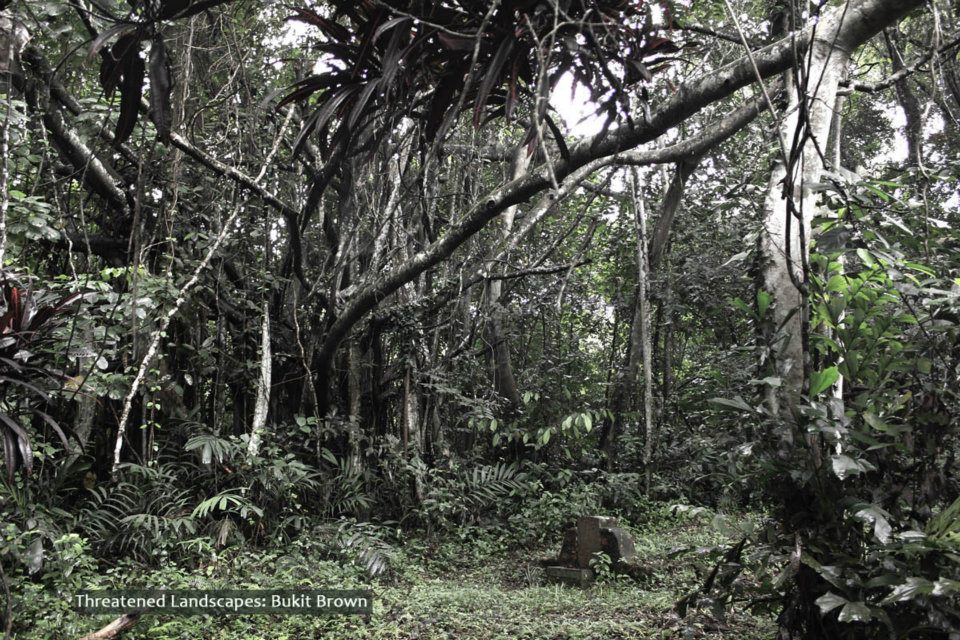
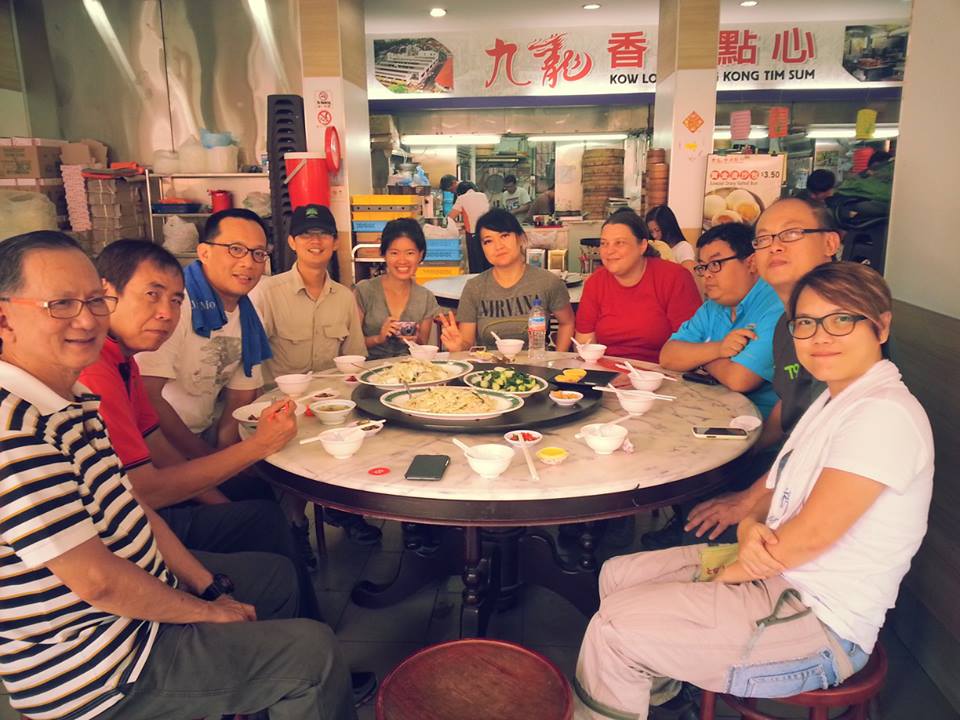

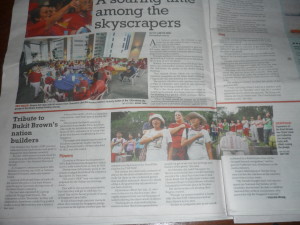


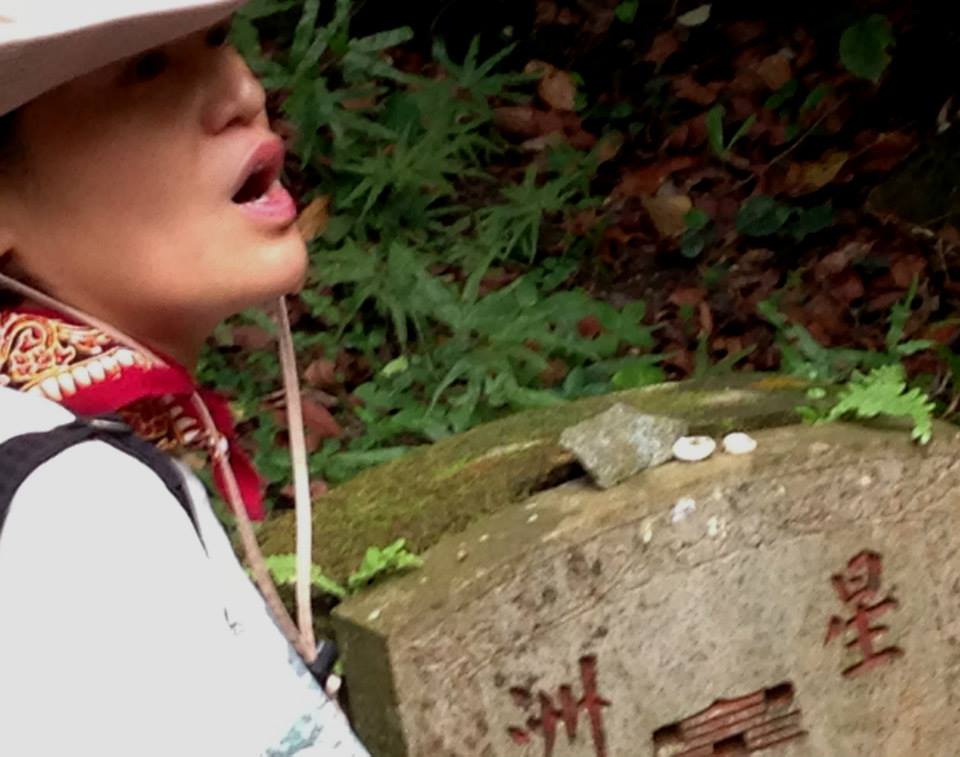

Comments